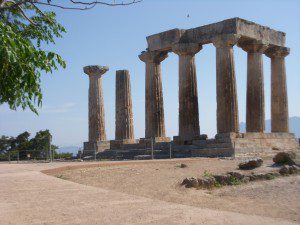Silly atheist arguments are pretty common, but a champion in the category must be: “You don’t believe in Zeus, Poseidon, and other traditional gods, so all that atheists are asking is to get rid of the last god.” I have written about this verbal confusion in the past: English uses the same word for God and gods. It isn’t just Christian preference that capitalizes the one and doesn’t capitalize the other, the two types of beings (God and god) are distinct. 
A god is a rational being more powerful than a human. If Superman existed, he would be a god. God in monotheistic faiths is totally “other than” other beings. He is the ground of being and there can can only be one God because of God’s attributes. If an all powerful being exists, then there can only be one!
The truth of polytheism and monotheism are not dependent on each other. Both could be true, both could be false, or one or the other could be true and the other false.
My pagan or heathen friends (preferred terms vary) assert that their gods exist as if that is the important thing, but I think it is probably the case that pagan/heathen gods exist. They simply are not worthy of my worship or my attention. If there are gods, then the existence of God is still the most important question to answer. If Superman existed and God existed, then God would be the more important of the two.
God (if He exists) is the Creator, ground of being, all knowing, all good, all powerful. There is no being like Him.
When I was a kid, we had the versus game: Superman versus Batman. Answer: Superman. Flash versus Batman. Answer: Batman. If God exists, then He would win all the versus games including God versus every other being that exists.
Deciding on the “God question” is necessary because even if many gods existed, I might be able to ignore, hide from them, or trick them. Apollo (if he exists) cannot be everywhere and so given the right strategy I can avoid him all together. If there is one thing I have learned from pagan literature it is that hanging out with gods is a bad idea. Even a decent god does not know his or her own power and can end up harming me without meaning to do so. Also, since they are not all good, if I get a favor from a god, the bill may come due. A wiseman owes the gods nothing.
Paganism is based on experience and observation of the world. Theism is based on experience and reason.
 Given the philosophical arguments available to theism regarding the existence of God, I am more confident that God exists than gods since my belief in gods is based on experience while the existence of God is based on experience and reason. To give two examples, nothing like the ontological or kalaam arguments exists for the existence of pagan gods.
Given the philosophical arguments available to theism regarding the existence of God, I am more confident that God exists than gods since my belief in gods is based on experience while the existence of God is based on experience and reason. To give two examples, nothing like the ontological or kalaam arguments exists for the existence of pagan gods.
And yet given my own experience of the world and the experiences of many people in many places at many times, it seems plausible that gods exist.
Now an atheist reading will snort that surely there is no Zeus on top of Mount Olympus sitting in a golden chair throwing lightening bolts. This is true: some assertions about Zeus are false. These facts were known by ancient pagans and it does not mean Zeus does not exist anymore than any mistaken belief about a being shows the being does not exist. If you believe that I live in California (still!) that does not mean I do not exist if you are wrong and am blessed enough to live in Texas.
Apollo is not on (literal) Olympus, but Apollo might still exist.
The difficulty is that if God exists, then by definition He is worthy of worship: God is all good. If Apollo exists, Apollo may or may not be good or worthy of veneration. He is not going to be worthy of worship (in the sense monotheists use the term). I venerate good men such as Abraham Lincoln and so I might venerate Apollo if he is worthy, but is He? From the point of view of Christian theology, Apollo might exist and be a demon. Demons are tricky and can give some treats, but the treats are always fatal. Apollo might be an angel that people see and misidentify, but at that point it seems safer not to use the pagan name.
It is, of course, a great big universe and so Apollo could be another kind of being altogether not mentioned in the Bible or Church teaching. If so, then given the dangers associated with poking around in the supernatural world without guidance, a wiseman would leave Apollo alone.
If Apollo is a demon, a Christian must rebuke the demon in Christ’s name. If Apollo is actually an angel misidentified, a Christian would clean up the nomenclature and leave the angelic host to the God who governs them. If Apollo is some other kind of being altogether, a Christian might speculate on his nature, but with great caution.
I think polytheism (in some form) and Christian monotheism are true: gods exist and God exists. As a result, I reject polytheism.











